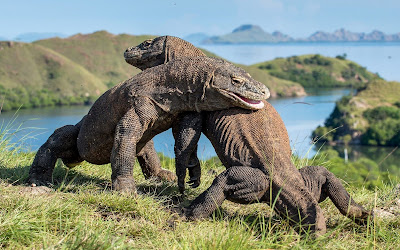''GENTLEMEN,'' I said to our boys the night we left for Indonesia, ''are you sure you're ready to see real dragons?''
The face of our youngest son, Asa, 7 at the time, lit up. He still lived in his own world, apart from the rest of us, where real and make-believe weren't so easy to distinguish.
But his older brother, Apollo, 9 was entering that age where everything I said was was slightly suspect. ''Come on, Dad,'' he said. ''I know exactly what animals you're talking about. Those aren't dragons. They're just big fat lizards.''
I frowned at him. I had sent about 150 emails, texts and WhatsApp messages and spent thousands of dollars to get him and his brother in front of those ''big fat lizards.''
''You'll see,'' I said. ''They are dragons. And they are real.''
For as long as I could remember, I'd been fascinated by Komodo dragons, huge killer reptiles confined to a few remote islands. I knew it would take some work to get to them, so the dragons became our excuse for a little family adventure, our raison d'travel.
Ask our kids what they want to be when they grow up and they'' say, ''Jungle explorer.'' So last winter my wife, Courtenay and I thought :
Let's do that for a vacation. Let's explore some jungles. Let's pack as many different stunning, pristine and natural environments into one-two week trip as possible and check in on the state of our world, starting with the dragons.
Of course, I got the dragon bit totally wrong and we'd soon learn that other wildlife we'd encounter -the orangutans, the scope owls, the unjustly athletic gibbons and hypnotizing mantarays - was infinitely more interesting.
But perhaps the greatest discovery we made was within our own complicated species. We found, pretty easily, without hiring a tour company, and just by thumbing through old-fashioned guidebooks augmented by Google searches, a network of one-man conservationist organizations that knew every nook and corner of the terrain we wanted to explore.
I'm sure they're out there in each country, but I can say with certainty that Indonesia offers an inspiring coterie of hard-working marine guides, bird guides, forest experts and other self-educated naturalists. They were all enthusiastic about showing off their slice of the world - sometimes, perhaps a little too enthusiastic.
Its easy to see how they get carried away. With its 18,000 island strung across the Equator, many with their own unique plants and animals separated by relatively short distances, Indonesia is a naturalist's promised land.
The honor and serving of the latest operational research on Indonesia, continues. The World Students Society thanks author Jeffrey Gettleman.

.png)


0 comments:
Post a Comment
Grace A Comment!